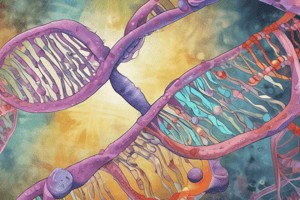Podcast
Questions and Answers
What is the term for a uniform addition of a chromosome to all original pairs?
What is the term for a uniform addition of a chromosome to all original pairs?
- Euploidy (correct)
- Trisomy
- Monosomy
- Aneuploidy
What is the characteristic feature of Trisomy 21?
What is the characteristic feature of Trisomy 21?
- Severe cognitive impairment and physical abnormalities
- Lymphedema at birth, short stature, and lack of secondary sex characteristics
- Large tongue, slanting eyes, semi-crease on hands, hypotonia, cardiac delays, and cognitive impairment (correct)
- Severe malformations and a shorter life span
What is the name of the syndrome caused by an extra chromosome 18?
What is the name of the syndrome caused by an extra chromosome 18?
- Turner syndrome
- Edwards syndrome (correct)
- Klinefelter syndrome
- Patau syndrome
What is the characteristic feature of X-linked recessive inheritance?
What is the characteristic feature of X-linked recessive inheritance?
What is the name of the syndrome caused by an extra X chromosome in males?
What is the name of the syndrome caused by an extra X chromosome in males?
What is the characteristic feature of X-linked dominant inheritance?
What is the characteristic feature of X-linked dominant inheritance?
What is a characteristic of X-linked traits?
What is a characteristic of X-linked traits?
In an autosomal dominant disorder, what is the minimum number of altered gene copies required for a person to be affected?
In an autosomal dominant disorder, what is the minimum number of altered gene copies required for a person to be affected?
What is the chance of a child inheriting a mutant allele and being affected if one of their parents has an autosomal dominant disorder?
What is the chance of a child inheriting a mutant allele and being affected if one of their parents has an autosomal dominant disorder?
What is the chance of a child having a condition if both parents are carriers of an autosomal recessive variant but do not have the condition?
What is the chance of a child having a condition if both parents are carriers of an autosomal recessive variant but do not have the condition?
When should the nurse collect the newborn's blood screening for genetic disorders?
When should the nurse collect the newborn's blood screening for genetic disorders?
Flashcards
Euploidy definition
Euploidy definition
Uniform addition of a chromosome to all original pairs.
Trisomy 21 characteristics
Trisomy 21 characteristics
Large tongue, slanting eyes, semi-crease on hands, hypotonia, cardiac delays, and cognitive impairment.
Edwards Syndrome cause
Edwards Syndrome cause
Extra chromosome 18.
X-linked recessive inheritance
X-linked recessive inheritance
Signup and view all the flashcards
Klinefelter syndrome cause
Klinefelter syndrome cause
Signup and view all the flashcards
X-linked dominant inheritance
X-linked dominant inheritance
Signup and view all the flashcards
X-linked trait inheritance
X-linked trait inheritance
Signup and view all the flashcards
Autosomal dominant disorder copies
Autosomal dominant disorder copies
Signup and view all the flashcards
Autosomal dominant inheritance chance
Autosomal dominant inheritance chance
Signup and view all the flashcards
Autosomal recessive carrier chance
Autosomal recessive carrier chance
Signup and view all the flashcards
Newborn screening timing
Newborn screening timing
Signup and view all the flashcards
Study Notes
Chromosome Disorders (Cytogenetics)
- Euploidy: uniform addition of chromosomes to all original pairs
- Types of euploidy: trisomy and monosomy
Trisomy
- Trisomy: additional chromosome added to a pair
- Trisomy 21 (Down syndrome): Chr-47, XX, +21
- Symptoms: large tongue, slanting eyes, semi-crease on hands, hypotonia, cardiac delays, cognitive impairment
- Trisomy 18 (Edwards syndrome): Chr-47, XX, +18
- Symptoms: severe cognitive impairment and physical abnormalities, shorter life span
- Trisomy 13 (Patau syndrome): Chr-47, XX, +13
- Symptoms: severe malformations, short life span
Sex Chromosome Aneuploidies
- Alterations in the number of sex chromosomes
- Examples: Klinefelter syndrome, Turner syndrome
- Klinefelter syndrome (47-XXY): gynecomastia, small testes, infertility, long arms/legs
- Turner syndrome (45-X or 45-X0): lymphedema at birth, short stature, lack of secondary sex characteristics during adolescence, cardiac issues
Inheritance Patterns
- X-linked Recessive inheritance
- Affected individuals are principally males
- Carrier females are normal, males are not carriers
- Example: Hemophilia
- X-linked Dominant inheritance
- Variant in one copy can cause the disorder in males (with one X)
- Variant can cause the disorder in females (with two X's)
- Fathers cannot pass X-linked traits to their sons
- Example: Fragile X Syndrome
- Autosomal Dominant inheritance
- One altered gene copy in each cell is sufficient for the disorder
- Children of an affected parent have a 50% chance of inheriting the mutant allele and being affected
- Examples: Huntington's disease, Marfan syndrome
- Autosomal Recessive inheritance
- Variants occur in both copies of the gene in each cell
- If both parents are carriers, their kids have a 25% chance of having the condition
- Examples: Cystic fibrosis, Sickle cell disease
Studying That Suits You
Use AI to generate personalized quizzes and flashcards to suit your learning preferences.



